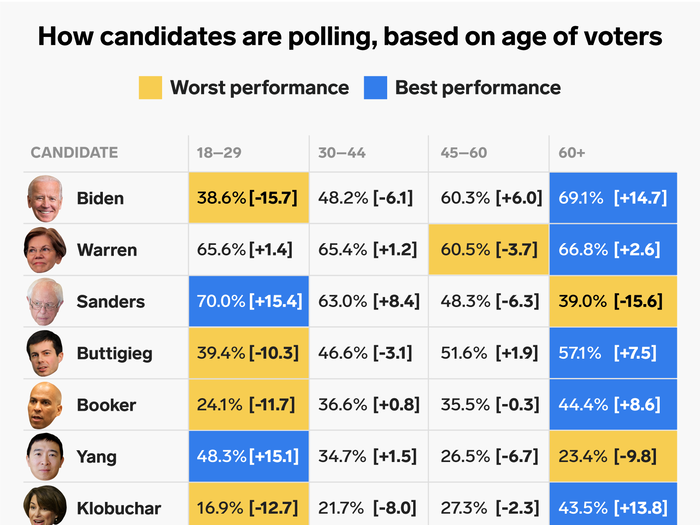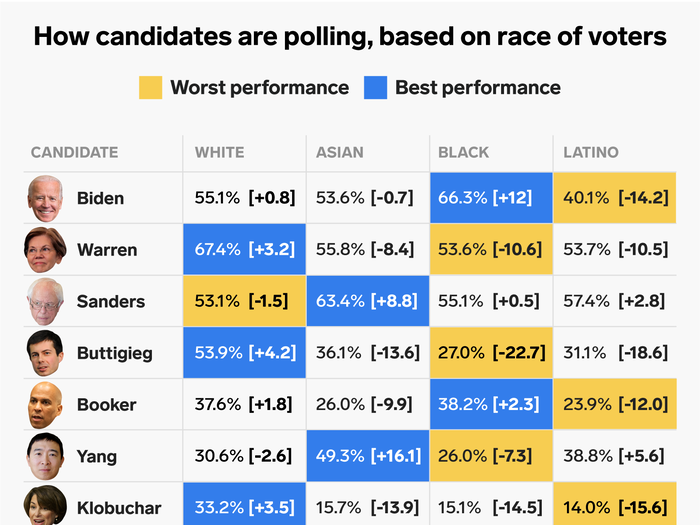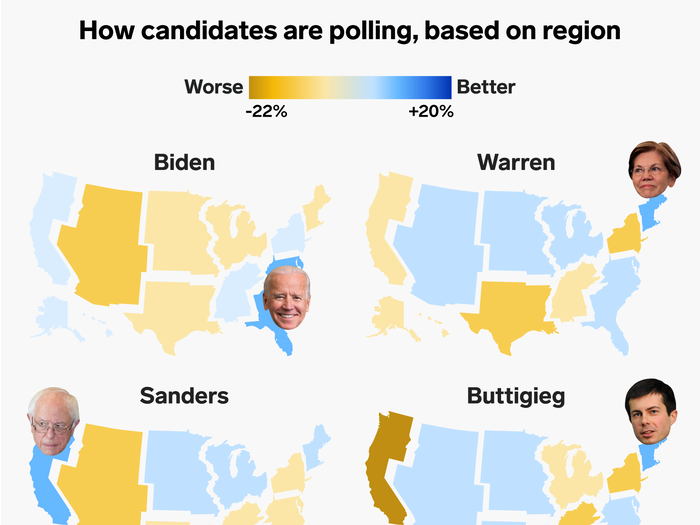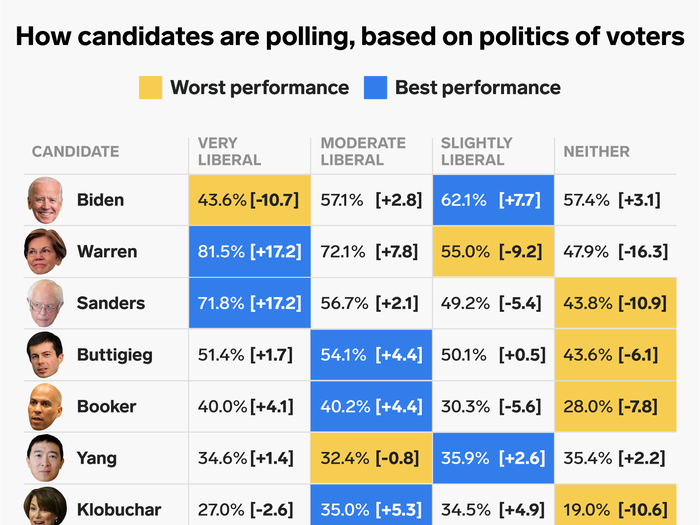- Home
- slideshows
- miscellaneous
- There are just 6 weeks until the first primary. Here's where the Democratic contenders stand based on gender, race, age, and geography.
There are just 6 weeks until the first primary. Here's where the Democratic contenders stand based on gender, race, age, and geography.
Men and women view the race differently: Sen. Amy Klobuchar, Mayor Pete Buttigieg, and Sen. Elizabeth Warren do better among women, while Andrew Yang, Mayor Michael Bloomberg, and Sen. Bernie Sanders do better among men.

Age is one of the most polarizing factors in the race. Just a few candidates — Sen. Elizabeth Warren foremost among them — do about as well as usual among all age brackets in the set.

Age is one of the most remarkable splits in this primary.
In one corner, there are candidates that excel among younger people: Sen. Bernie Sanders is satisfactory as nominee for 70% of voters aged 18 to 29, which is over 15 percentage points better than his performance overall. On the other hand, he's at 39% among those 60 and up, which is 16 percentage points less than usual. Andrew Yang has a considerable younger skew as well.
In the other corner, you've got candidates that do poorly among young people but very well among older Democratic primary voters. Former Vice President Joe Biden's numbers are functionally the inverse of Sanders' — underperforming among young people by 16 percentage points and over-performing among those 60 and up by 15 points.
He's not alone: Mayor Pete Buttigieg has a remarkable older skew, despite being the youngest contender in the field, and Sen. Amy Klobuchar and Sen. Cory Booker haven't resonated with young people.
Among the frontrunners, Sen. Elizabeth Warren does basically as well among young people as older people, among Gen X and Gen Z. Make no mistake, that's an advantage: respondents 18 to 29 were about a quarter of our Democratic respondents, and those 60 and up were about a fifth, so it's going to take a broader coalition to pull off a win.
In 2016, exit polls showed that 45 percent of Clinton voters were not white, and the winner of the Democratic primary will have to build a coalition of White, Black, Latino and Asian Americans.

Much of the conversation about the race has meandered around this chart: African Americans were about a fifth of Clinton's voters, but just two candidates — Joe Biden and Sen. Cory Booker — do better among Black respondents than the typical Democratic primary voter.
Some candidates, Mayor Pete Buttigieg and Sen. Elizabeth Warren in particular, significantly underperform among respondents of color, not just Black Americans but Asian and Latino respondents as well.
There are other compelling features in this chart, such as Sanders' and Yang's performance among Latinos, who do skew younger than the general population. Indeed, Sanders does worst among Caucasian respondents, a fascinating statistic given that he's the senator from Vermont, where 94% of people are white.
This chart is linked heavily to the next one, which is how they do region by region.
The four regions that allocate the bulk of the delegates to the Democratic National Convention are the South Atlantic (16%), Pacific (16%), Mid-Atlantic (16%) and Eastern Midwest (15%).

Most of the delegates that go to the DNC are from the coasts and the Great Lakes region, but the early states are in the Western Midwest, New England, the South Atlantic, and Mountain regions.
Everyone's got their base of support. Biden does best in the Mid-Atlantic and South, where African Americans make up a large percentage of the primary electorate. Warren's a coastal candidate, doing well in her New England home base but also the West Coast. Sanders does best out West, in the Mountain and Pacific time zones.
Mayor Pete is really interesting: he does merely okay in the eastern Midwest, where South Bend is. But he does really well in New England, where he went to college in Boston. Well, not in Boston, but nearby. (No, not Tufts.)
Other candidates have their bases of support: Sen. Amy Klobuchar is a force to be reckoned with in the Western Midwest, and the Mid-Atlantic is Bloomberg country and Yang is a West Coast candidate.
Candidates come from different wings of the party, and that's also going to be a major factor in this election.

We ask respondents what best describes their political views, asking them to choose between "Very liberal," "Moderately liberal," "Slightly liberal," "Neither liberal nor conservative," "Slightly conservative," "Moderately conservative" and "Very conservative."
Naturally, most of the people who said they were going to participate in the Democratic primary identified as some degree of liberal: 22% said very, 34% said moderately, and 14% said slightly liberal. Another 15% said they weren't liberal or conservative.
Some candidates like Biden, Yang, and Bloomberg appeal more the the slightly liberal contingent in the party. Others like Warren, Sanders, and Castro are most appealing to the very liberal wing. In the middle are candidates like Booker, Klobuchar, and Buttigieg, who thrive among the part of the party that self-described as moderately liberal.
(Altogether, 11% of respondents who said they'd participate in the Democratic primary identified as some degree of conservative, which is fairly normal — Trump is a unique opponent to say the least, and there are lots of reasons why a generally liberal or conservative worldview does not define an individuals vote — but those were left off this chart for sample size purposes. Worth highlighting is that Rep. Tulsi Gabbard does remarkably well among this group of people.)
This chart is instructive, because it's simply not possible to assemble a winning coalition of Democrats without being a little appealing to people across the party.
- Read more:
- Biden saying he'd only serve one term would be an Election Day risk with little reward, new Insider poll shows
-
POWER RANKING: Here's who has the best chance of becoming the 2020 Democratic presidential nominee
- The Bernie Bro is over. Introducing the Yang Bro, the Bloomberg Bro, and the Gabbard Bro.
Popular Right Now
Popular Keywords
Advertisement